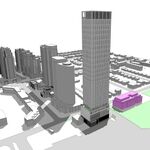There is a difference between city X and Y. If city X and Y were designed and built in the same way, people in X can stay in X and vice versa. The dependency would reduce hence lower congestion and lower chance of spreading COVID-19 these days too. Integrating both city won't solve the problem as X would stay in X while Y might want to go to X but X would never want to go to Y.
This kind of boarder is visible in Toronto itself. Look at Dundas and Runnymede, the boarder between Old Toronto and York. Immediately east, everything is well developed with an urban feel in The Junctions. West of it, you'll immediately feel different. Transit usage totally drops off with the 40B bus short turning leaving half as much service on the 40A. You'll see most of the bus would empty off passed this invisible boundary at Runnymede. Route 40 is now fully integrated but the integration itself didn't trigger the change.
The point is people don't do A, so doing B won't make people do A. Fully integrating the GTA won't bring a boom to 905 transit itself. The 905 needs to do more to attract people to transit than simple integration. Fare subsidy is another question. The TTC got rid of fare zones between the Old city and the rest of Metro Toronto. The result was downhill from running a profit to more and more subsidies every since 1973. It ain't going away.





